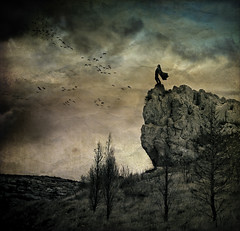Finishing Two Quarters with Everett Cattell

Image by Midnight-digital via Flickr
This past Friday I dropped my paper in an envelope, paid the $2.63 postage and sent it off to Elkhart, IN at 4 pm, an hour before the deadline. Leaving the post-office, I felt much lighter. Not only was a six-month weight off my shoulders, but the fifty-seven pages that resulted from those six months of work was no longer in my bag. Just like every other student during finals week, I had moments of cold sweat, moments when I was sure I wasn’t going to finish, and other moments when I was sure I was going to die; and just like every other student I was still standing on two feet, with head-high at 5:01pm this Friday (albeit a little worse for wear).
This past summer I started a tutorial with Mennonite Missiologist Wilbert Shenk, a professor who helped to radically change my academic direction 4 years ago. For the first part of the tutorial with Shenk, I got to sit in on a class he did with a number of Fuller masters students on “Mission Theology in Anabaptist Perspective.” After finishing the class and the reading for that part of the course, I turned my attention to one of the most prominent Quaker missionaries (and ecumenical leader) of the past century, Everett Lewis Cattell. My interest in Cattell came when I discovered that he was a missionary who wrote a lot the subject of missiology (already a rare find in the Quaker tradition), deeply interested in Friends renewal, and part of the very fabric of my alma mater. For those of you who know me, these first two topics are not only things I am personally interested in, but they are also the topics that make up my academic inquiry. As far as Malone College goes, it’s where I became a Friend. Later, after studying his life more, I also found that he lived for a time in Alliance, Ohio, a city I spent my teenage years in as well and where some of my siblings still live.
I spent the rest of about three months digging through Everett Cattell’s history and missiology, trying to determine just what made Cattell so special, and what was unique about his vision for “The Future of Friends.” What I discovered was that Cattell’s holiness commitments led him to approach his missionary experience in Bundelkhand India (21 years) with a wide-open heart to joining the work of the Spirit wherever it might be. And this openness to what missiologist call the missio Dei in turn led him to have a uniquely mission-driven vision for Friends renewal. In my paper, I argued that it is his missiology that reveals the truly unique contribution to Quakerism, a contribution that has the potential to bring about a renewal among Friends. In other words, rather than read the origins of the Quaker tradition as primarily an extension of the holiness movement (Spencer), an apocalyptic movement (Gwyn), the rebirth of Gnosticism (Bailey), Radical-Puritanism (Barbour), mystic (Jones), or even prophetic (Benson), it was first and foremost a zealous missionary movement guided to renew and bring both the world and the church under the Lordship of Jesus Christ. That Cattell starts his ecclesiology off first with mission leaves room for much of these other interpretations to follow, namely that mission in its realized-apocalyptic form has a particular prophetic tone, that takes on characteristics of a variety of holiness strands of Christianity, while embodying the practices and responses of the Radical-Reformation.
This view is far closer to my own understanding of the orgins of Quakerism, and matches better the orgins of every radical-reforming movement throughout the history of the Church (cf. Shenk 1984). Therefore, it’s not surprising that I find Cattell to be a comelling Quakerly example of how we might (today) envision a way forward for the Church. Anyways, by the end of my paper I realized there was so much more I could have written, so many ideas I wanted to experiment with, that Cattell would have been a great subject for my entire dissertation! Unfortunately, at this point he can’t take center stage (I’m more than halfway done with my coursework now) but he is going to play a major role in my work in the foreseeable future.
Now that I’m all done with this project, and climbed this massive hill, it’s almost time to start again on something new. Next quarter, I will be doing field research, so less books and more on the ground research. I look forward to it.
Also, I thought I’d make available the bibliography for my paper for any of you interested in (Quaker and Anabaptist) missiology, and specifically Everett Cattell: Quaker and Anabaptist Missiological Bibliography.
Thanks also to my mother-in-law who came out to watch L, so that I could be freed up to write over the last week and half. Not that we had to twist grandma’s arm or anything to get her to fly out to see this cute kid, but I’m still thankful. 😉
![Reblog this post [with Zemanta]](http://img.zemanta.com/reblog_e.png?x-id=eeecbd79-5ff2-44a9-a528-4bdbbfd17c86)